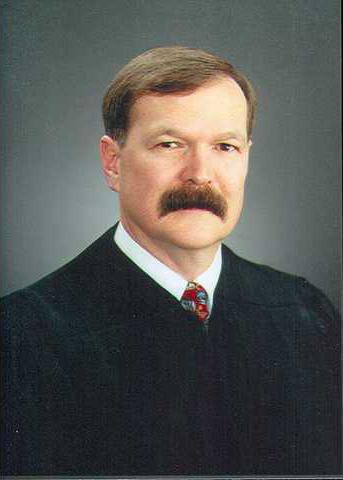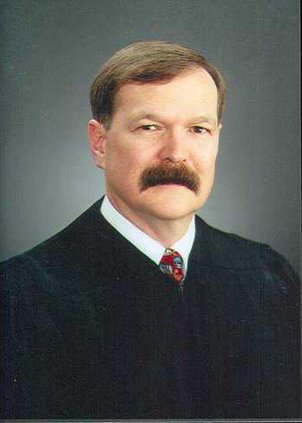Those looking into the courts
The full membership of the Blue Ribbon commission includes: Court of Appeals Judge Patrick McAnany, chair, Topeka; Wyandotte County District Judge Constance Alvey, Kansas City; Bob Boaldin, of Epic Touch communications company, Elkhart; Barton County Counselor/Administrator Richard A. Boeckman, Great Bend; Wabaunsee County District Magistrate Judge Blaine A. Carter, Alma; 12th Judicial District Chief Judge Kim W. Cudney, Washington; and Graham County Clerk of the District Court Donna L. Elliott, Hill City.
Trego County District Magistrate Judge Richard Flax, Wakeeney; Kansas Corporation Commissioner Joseph F. Harkins, Topeka; Karen H. Hester, University of Kansas School of Law, director of career services and director of diversity and inclusion, Lawrence; Martha Hodgesmith, University of Kansas associate director for disability policy, Lawrence; State Sen. Jeffrey R. King, Independence; Susan Lynn, editor and publisher of The Iola Register, Iola; Doris Miller, co-owner of Rocking M Radio, Manhattan; Mike Padilla, Kansas Department of Revenue, Alcoholic Beverage Control chief enforcement officer, Topeka; and Linda Parks, attorney and managing partner, Hite, Fanning & Honeyman, Wichita;
Reginald Robinson, Washburn University School of Law Professor, Topeka; Gerald O. Schultz, Attorney, Garden City; Sam H. Sheldon, Haley Title Company attorney and owner, Ottawa; State Sen. John Vratil, Overland Park; Finney County Attorney John P. Wheeler, Jr., Garden City; Calvin Williams, Attorney, Colby; Sam Williams, managing partner/CPA, Sullivan Higdon & Sink, Wichita; and Riley County District Judge Meryl D. Wilson, Manhattan.
TOPEKA – In light of reduced judicial resources statewide, a new "Blue Ribbon" commission has been named to take a thorough and critical look at the Kansas court system to find ways to improve it and make it more efficient, it was announced Wednesday.
The 24-member commission, established by Kansas Chief Justice Lawton R. Nuss, includes Barton County Administrator Richard Boeckman.
"The Commission’s recommendations will have the potential to provide the most dramatic changes to the judicial branch of government since court unification in the 1970s," Nuss said in a news release. "The Supreme Court is committed to finding ways to function as efficiently as possible so that we can assure Kansans receive justice that is sensitive, compassionate, swift, and accurate."
The composition of the commission impressed Boeckman. "They have a nice mix of lawyers and non-lawyers, as well as nice representation from rural areas and urban areas."
Nuss said between July 1, 2009, and June 30, 2010, Kansas state courts handled over 500,000 cases, including over 170,000 traffic cases. There are about 266 judge positions and 1,590 non-judicial positions authorized for the state courts, but budget cuts require the system to currently maintain on average 75-80 vacancies, or 5 percent of the non-judicial work force.
In Barton County, there were 5,665 cases filed between January and December 2010. That includes all cases, civil, criminal and traffic.
Kansas Court of Appeals Judge Patrick D. McAnany, a former two-term chief judge of the Johnson County District Court, was named chairman. He has been a Judge of the Court of Appeals since 2004.
McAnany and the other members will have at their disposal the first-ever "weighted case load study." This review measures the apples to apples time and personnel required to process cases by considering case complexity, the driving time for rural judges and administrative burdens.
This also appealed to Boeckman, who himself is an attorney. "Improving efficiency is a good idea, but we don’t want rural Kansas to lose access to the judicial system."
When he was in private practice, he traveled in the western part of the state. "I saw how hard those judges worked." They may not have as heavy of a case load, but they heard cases in far-flung courtrooms.
According to information from the Supreme Court, such a weighted study has been recommended in Kansas since at least 1944 and by almost all commissions formed since that time to review Kansas courts.
Nuss said the commission is authorized to consider the number of court locations needed, the services provided in each location, hours, use of technology, cost, flexibility in staffing, and any other operational efficiencies.
The commission will submit a report to the Supreme Court. It is expected the report will contain recommendations for action the court can take on its own, as well as action that requires legislative approval or state constitutional change.
"We want many alternatives presented that could lead to a better system of justice in Kansas," Nuss said. "We also want to ensure we are being optimum stewards of our taxpayer resources."
Nuss said the Court’s appointment of the Blue Ribbon Commission, and the weighted case load study, were in large part the result of a historic Spring 2010 in which the state’s courts were forced to close, for the first time in their nearly 150-year history, due to lack of money.
A similar commission in 1974 brought about the unification of the state courts.








